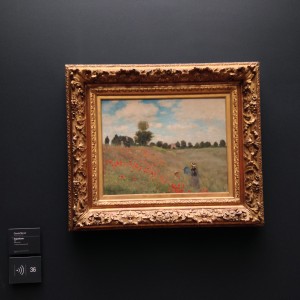Over spring break, I made a quick hop across the Atlantic on a vacation to Paris with my parents and two of my siblings. It was a great trip — we ate plenty of fantastic food and saw all there is to see of the City of Lights. It was also nice to catch up with my siblings and parents. In addition to walking the Seine and the Champs-Élysées, the trip was an opportunity to wander the halls of some of the world’s most renowned galleries of art.
While visiting the Lourve, the Musée d’Orsay, the museum/garden housing the sculptures of Auguste Rodin, and the national museum of Picasso, I was struck by how what I had learned in art history at Middlebury all came rushing back to me. I took a course called Monuments and Ideas in Western Art my sophomore year, which was taught in the History of Art and Architecture department. I had never taken an art history course before, and knew very little about art outside of being able to recognize the big-name artists that occupy places of honor in galleries like the Lourve.
However, while taking the course I was completely enthralled. In many ways, the course was both a broad and deep introduction to what a person needs to know to be an educated consumer of art, even art as varied as sculpture, painting, and architecture. We began our exploration in antiquity, examining depictions of Caeser Augustus and various Greek gods in sculpture, and ended with the perplexing and thought-provoking postwar work of Picasso on canvas.

“Poppy Field,” 1873, by Claude Monet is in the Musée d’Orsay and was one of my favorite pieces that I saw there during my recent visit.
While visiting the museums of Paris, I was surprised at my ability to take what I had learned several semesters ago and apply it to the art in front of me. It is a testament to the dedication and skill of Middlebury professors, like my professor of Art History. Faculty at Middlebury work tirelessly when teaching a course so that students from a variety of academic backgrounds or interests find the material highly informative, memorable, and rewarding for a lifetime of learning.
Of course, the credit also goes to the liberal arts philosophy of Middlebury. The College has a commitment to broad learning across many different disciplines through the distribution requirements, such as the Art requirement, that cause students (myself included) to explore new and important areas of the curriculum that they might not encounter on their own. You never know where knowledge you pick up at Middlebury is going to serve you well, whether in the museums of France or another locale far across the globe.
